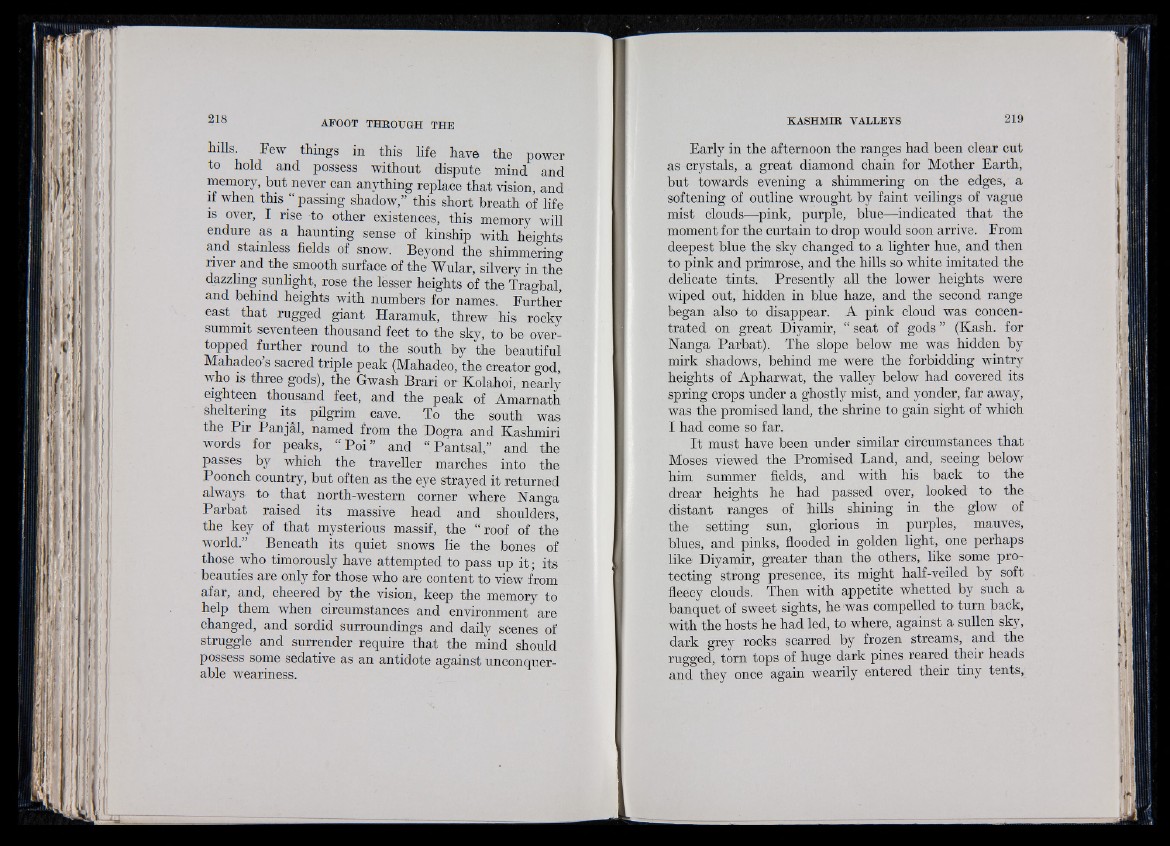
hills. Few things in this life have the power
to hold and possess without dispute mind and
memory, but never can anything replace that vision, and
if when this “ passing shadow,” this short breath of life
is over, I rise to other existences, this memory will
endure as a haunting sense of kinship with heights
and stainless fields of snow. Beyond the shimmering
river and the smooth surface of the Wular, silvery in the
dazzling sunlight, rose the lesser heights of the Tragbal,
and behind heights with numbers for names. Further
east that rugged giant Haramuk, threw his rocky
summit seventeen thousand feet to the sky, to be overtopped
further round to the south by the beautiful
Mahadeo s sacred triple peak (Mahadeo, the creator god,
who is three gods), the Gwash Brari or Kolahoi, nearly
eighteen thousand feet, and the peak of Amarnath
sheltering its pilgrim cave. To the south was
the Pir Panjal, named from the Dogra and Kashmiri
words for peaks, “ P o i” and “ Pantsal,” and the
passes by which the traveller marches into* the
Poonch country, but often as the eye strayed it returned
always to that north-western corner where Nanga
Parbat raised its massive head and shoulders,
the key of that mysterious massif, the “ roof of the
world.” Beneath its quiet snows lie the bones of
those who timorously have attempted to pass up it; its
beauties are only for those who are content to view from
afar, and, cheered by the vision, keep the memory to
help them when circumstances and environment are
changed, and sordid surroundings and daily scenes of
struggle and surrender require that the mind should
possess some sedative as an antidote against unconquerable
weariness.
Early in the afternoon the ranges had been clear cut
as crystals,., a great diamond chain for Mother Earth,
but towards evening a shimmering on the edges, a
softening of outline wrought by faint veilings of vague
mist clouds—pink, purple, blue—indicated that the
moment for the curtain to drop would soon arrive. From
deepest blue the sky changed to a lighter hue, and then
to pink and primrose, and the hills so white imitated the
delicate tints. Presently all the lower heights were
wiped out, hidden in blue haze, and the second range
began also to disappear. A pink cloud was concentrated
on great Diyamir, “ seat of gods ” (Kash. for
Nanga Parbat). The slope below me was hidden by
mirk shadows, behind me were the forbidding wintry
heights of Apharwat, the valley below had covered its
spring crops under a ghostly mist, and yonder, far away,
was the promised land, the shrine to gain sight of which
I had come so far.
I t must have been under similar circumstances that
Moses viewed the Promised Land, and, seeing below
bim summer fields, and with his back to the
drear heights he had passed over, looked to the
distant ranges of hills shining in the glow of
the setting sun, glorious in purples, mauves,
blues, and pinks, flooded in golden light, one perhaps
like Diyamir, greater than the others, like some protecting
strong presence, its might half-veiled by soft
fleecy clouds. Then with appetite whetted by such a
banquet of sweet sights, he was compelled to turn back,
with the hosts he had led, to where, against a sullen sky,
dark grey rocks scarred by frozen streams, and the
rugged, torn tops of huge dark pines reared their heads
and they once again wearily entered their tiny tents,